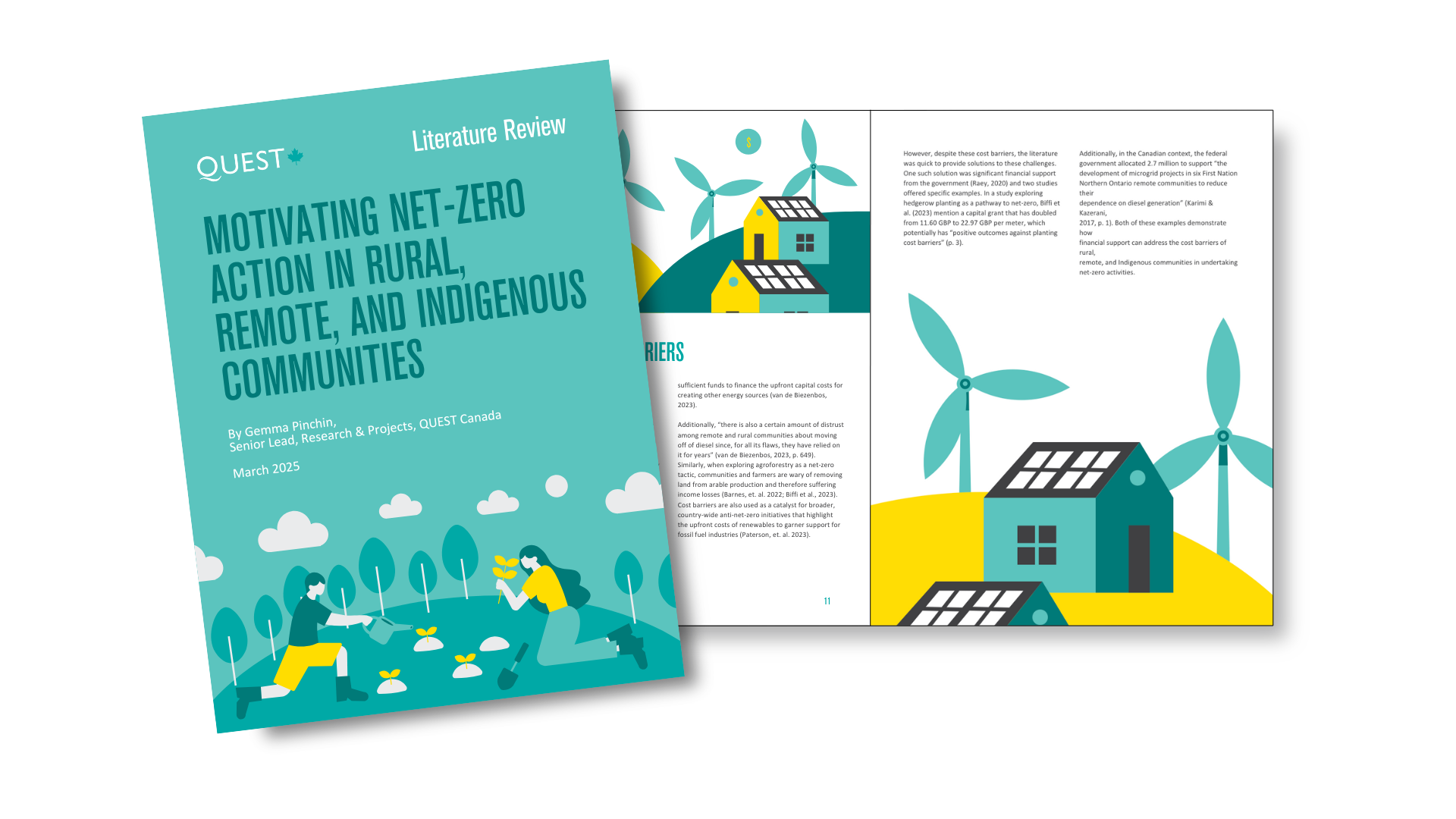News Release
New Research Highlights Path to Net-Zero Solutions and Socio-Economic Benefits for Rural, Remote, and Indigenous Communities

March 25, 2025 – QUEST Canada, a leading charity dedicated to advancing Canada’s transition to net-zero, has released a groundbreaking literature review that explores the opportunities and challenges rural, remote, and Indigenous communities face in achieving net-zero targets. The review, titled Motivating Net-Zero Action in Rural, Remote, and Indigenous Communities (MNZA), provides fresh insights into how these communities can benefit from a solutions-focused approach while addressing their unique socio-economic needs.
Produced with funding provided through the Environmental Damages Fund’s Climate Action and Awareness Fund, administered by Environment and Climate Change Canada (ECCC), and part of a larger research project of the same name, the literature review explores the motivations and barriers to net-zero action in rural, remote, and Indigenous communities across Canada.
With one in five Canadians living in rural communities (Infrastructure Canada, 2021), the dominant urban-focused approach to the energy transition leaves many communities underrepresented and often overlooked. The review highlights the pivotal role rural, remote, and Indigenous communities can play in Canada’s collective transition to a net-zero economy. The findings underscore the importance of taking a tailored approach that recognizes the distinct energy needs, land use challenges, and socio-economic conditions of these regions, which differ significantly from those of urban centers.
“Rural, remote, and Indigenous communities are often left out of the conversation on climate action, but they hold immense potential for driving solutions that benefit not only their communities but the entire country. Our research demonstrates that while there are real challenges in these regions—such as cost barriers, energy access issues, and transportation limitations—there are also significant socio-economic benefits from pursuing net-zero pathways, including job creation, economic development, and community empowerment.”
Socio-Economic Benefits of the Net-Zero Transition
The literature review reveals that, far from being a burden, the transition to net-zero energy systems presents multiple socio-economic opportunities for rural, remote, and Indigenous communities. From job creation in clean energy sectors to local economic growth through investments in renewable energy infrastructure, the review identifies compelling reasons why net-zero action is both necessary and beneficial for these communities.
Further, Indigenous communities, often the most disadvantaged in terms of energy access, stand to benefit significantly from net-zero initiatives that prioritize local ownership and self-determination. The review cites examples like the Wataynikaneyap Power project in Northern Ontario, which has successfully connected remote Indigenous communities to the Ontario power grid, injecting millions into the Canadian economy and creating numerous employment opportunities.
Challenges and the Need for a Tailored Approach
Despite the considerable benefits, the review also identifies a range of challenges facing rural, remote, and Indigenous communities as they strive to reduce emissions and move toward sustainable energy systems. These include high capital costs for renewable energy projects, lack of access to transmission infrastructure, and the unique geographical challenges posed by these regions.
The literature emphasizes the need for policies that address these barriers while also promoting equity, particularly for Indigenous communities, who have historically been excluded from decision-making processes regarding energy projects. Decolonization and self-determination are critical themes in the review, with a focus on ensuring that Indigenous knowledge and leadership are central to net-zero solutions.
A Collaborative Path Forward
As part of its ongoing commitment to supporting rural, remote, and Indigenous communities, QUEST Canada will be collaborating with 15 communities across the country to develop a jurisdictional scan to help communities uncover and accelerate the benefits of a net-zero transition. Through interviews, workshops, and community engagement, QUEST Canada aims to provide a platform for communities to share their experiences as they work towards a net-zero future.
“This literature review is just the beginning of a larger effort to empower underserved communities in Canada. Together, we’re uncovering net-zero solutions and ways forward to strengthen the socio-economic conditions of rural, remote, and Indigenous communities–directly acknowledging and confronting their unique challenges and needs.”
QUEST Canada’s efforts are aligned with national objectives to reach net-zero emissions by 2050, working to ensure that all communities are included in the transition. The review and subsequent initiatives emphasize the vital role that rural, remote, and Indigenous communities play in achieving these ambitious targets and the socio-economic benefits that can be realized through their active participation in the net-zero transition.
–30–
About QUEST Canada
QUEST Canada is a registered Canadian charity that supports communities in Canada on their pathway to net-zero. Since 2007, we’ve been facilitating connections, empowering community champions and advising decision-makers to implement energy use and emissions reduction solutions that best meet community needs and maximize local opportunities. With the goal of encouraging, assisting and enabling communities to contribute to Canada’s net-zero goals, we develop tools and resources, convene stakeholders and rights holders, and advise decision-makers.
Media Contact
To set up an interview, please contact:
Melissa Schweyer,
Manager, Strategic Growth & Communications
t: 866-494-2770 ext. 704
e: mschweyer@questcanada.org
Quotes

Gemma Pinchin, Senior Lead, Research and Projects at QUEST Canada
Read the quote
“Rural, remote, and Indigenous communities are often left out of the conversation on climate action, but they hold immense potential for driving solutions that benefit not only their communities but the entire country. Our research demonstrates that while there are real challenges in these regions—such as cost barriers, energy access issues, and transportation limitations—there are also significant socio-economic benefits from pursuing net-zero pathways, including job creation, economic development, and community empowerment.”

Tonja Leach, Executive Director at QUEST Canada
Read the quote
“This literature review is just the beginning of a larger effort to empower underserved communities in Canada. Together, we’re uncovering net-zero solutions and ways forward to strengthen the socio-economic conditions of rural, remote, and Indigenous communities–directly acknowledging and confronting their unique challenges and needs.”
Sign Up
Join the Conversation!
Sign up to get the latest news and updates about QUEST Canada events and receive QUEST Canada's monthly newsletter.
